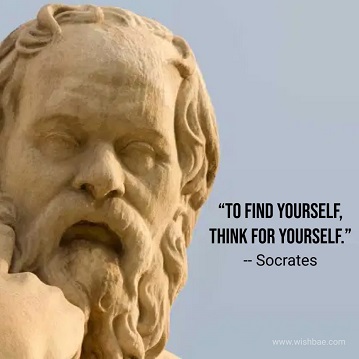|
Editor's last word:
from Wikipedia:
Daimonion (Ancient Greek: δαιμ?νιον, daimónion; Latin genius) is the name given in ancient literature to an inner voice which, according to tradition, gave philosopher Socrates warning signs to prevent him from making wrong decisions. Socrates considered the originator of these signs to be a deity whom he did not specify. He followed the beckoning voice, which was always given without explanation and which, according to him, always proved to be useful and helpful. If the daimonion remained silent, he interpreted this as approval of his behavior. As he talked about his experiences with the inner advisor, his relationship with the mysterious entity was widely known in his hometown Athens. Opponents accused him of introducing a religious innovation. This accusation contributed to him being sentenced to death and executed in 399 BC.
Credible contemporary information on the daimonion is scarce. The main sources are descriptions by Socrates' pupils Plato and Xenophon. The phenomenon was already considered mysterious in antiquity, led to the creation of legends and gave rise to various explanations. Platonists regarded the sign giver as a high-ranking daimon, a divine spirit being that acted as the philosopher's personal guardian spirit. Christian authors saw the advisor partly as a guardian angel and partly as a malevolent demon...
The word daimonion ('deity', 'demon') is the nounification of the neuter form of the adjective daimónios ('divine', 'demonic'), which is derived from the noun daimon (Greek δα?μων daímon 'divine being', 'demon'). According to a widespread but controversial research opinion, Plato uses it as an elliptical expression, i.e. as an adjective, whereby the corresponding noun - in this case sign - is omitted. Then the meaning is the divine/demonic sign; meaning the communication of the inner voice. According to an alternative interpretation, Plato, like his contemporary Xenophon, uses the word as a noun with the meaning 'the divine in general', 'an undefined deity'. Then it is not the sign that is meant, but its creator.
In Greek mythology, popular religion and philosophy, a daimon is either a god or a god-like spirit being that occupies a middle position between gods and humans. Such an intermediary being, a "demon", can be helpful or hostile. They are therefore not demons in the sense of the Christian idea of the consistently malicious nature of all demons, which still persists today. In the sources, the term daimon is used in particular when talking about an influence from a superhuman sphere, which is not attributed to a specific known god, but to an unknown higher power. Accordingly, the corresponding adjective daimonios and its substantivization also refer to an unspecified divine entity. This vagueness is an important aspect of the philosophical use of words by the early Socratics, the disciples of Socrates. The vague, abstract term daimonion is intended to indicate that the signs of the divine authority are perceived, but that the originator itself remains obscure and can therefore only be described in general terms as "something divine". It is unclear whether the sign giver is one of the gods of popular religion or an independent "demonic" spirit being that makes contact with Socrates, or a mysterious, purely inner entity that only operates in Socrates' mind.
Notes on “daimon” or “daimonion":
Jung, speaking of Freud: "his 'monotony of interpretation' [was] a flight from himself … the mystical (side of self) … a tragic figure… a great man… [but] in the grip of his [egoic] daimon.”
Will Durant, on the trial of Socrates: "The indictment was brought forward by Anytus, Meletus, and Lycon in 399, and read as follows: 'Socrates is a public offender in that he does not recognize the gods that the state daimon recognizes, but introduces new demoniacal beings' (the Socratic daimonion); "he has offended by corrupting the youth."
|
